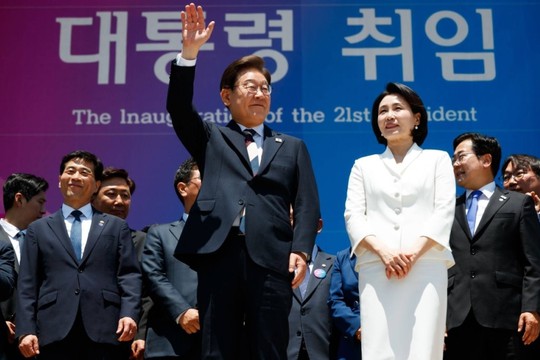South Korean President Lee Jae-Myung waves with his his wife, Kim Hye-gyeong, following his inauguration ceremony at the National Assembly in Seoul on Wednesday.
Photo: SIPA
New South Korean President Lee Jae-Myung took office Wednesday with a vow to end the “politics of division” and carry out a “pragmatic” approach to governing after riding a wave of anxiety about the economy and political instability to victory in an election that will have broad ramifications for Seoul’s relations with Tokyo, Washington and Pyongyang, writes ‘The Japan Times’.
In an inauguration speech before lawmakers and officials from his ruling Democratic Party and the opposition at the National Assembly, Lee, 61, pledged “to make hope bloom on deep and great wounds and to... create a completely new country,” adding that he would be “a president for everyone.”
Lee, who was the front-runner for the entire 60-day presidential campaign, won 49% of the vote, besting his conservative rival, Kim Moon-soo of the People Power Party (PPP), by 8 percentage points in Tuesday’s snap election, which was held exactly six months after then-President Yoon Suk Yeol declared martial law only to rescind it hours later.
Yoon’s move unsettled many South Koreans who saw it as a stark reminder of the country’s authoritarian past. Yoon was impeached by the National Assembly on Dec. 14, with the country’s Constitutional Court upholding his ouster in April.
Lee’s decisive electoral victory hands him a resounding mandate to go with a DP-controlled National Assembly that will aid him in carrying out a wide-ranging agenda.
First and foremost, he said he will tackle a deepening economic downturn “head-on,” immediately activating an emergency task force and signaling that his government will be “market-oriented.”
But any economic success will be heavily dependent on how he shepherds the country through tough tariff negotiations with the United States, which has slapped its South Korean ally with 50% levies on key exports such as steel, aluminum and automobiles.
Lee alluded to U.S. President Donald Trump’s tariffs, citing “rapid changes in the international order, such as the expansion of protectionism and the restructuring of supply chains” that he said “threaten our very survival.”
Lee “really has to restore a credible economic growth for the Korean economy, and this means sitting down with the Trump administration as soon as possible to reach an agreement on the tariffs,” Ramon Pacheco Pardo, an expert on the two Koreas and a professor at King's College London, told a panel discussion Wednesday.
The veteran politician’s ascendance to South Korea’s top office will also have broad foreign policy implications, including for bolstered ties with Japan and the United States.
In his speech Wednesday, Lee said his government would continue Yoon’s policy of strengthening cooperation with Japan amid concerns in Tokyo that he might reverse agreements reached under his ousted predecessor that led to a thaw in ties, including boosted trilateral military cooperation with their mutual ally, the U.S.
On the campaign trail, Lee, who had in the past been known for a seemingly hard-line stance toward Japan — including his fierce opposition to the Yoon administration's third-party compensation plan for Korean wartime laborers at Japanese factories and mines before and during World War II — denied this was the case, calling it a “preconception.”
“Japan is a neighboring country, and we must cooperate with each other to create synergy,” he said late last month.
But despite his professions, Lee’s tempered views in the run-up to the election left some suspicious.
Evans Revere, a former U.S. State Department official who worked extensively on Korean Peninsula issues, said that while the new South Korean leader “rebranded himself on the campaign trail as a ‘centrist-conservative’ by moderating many of his earlier extreme foreign policies ... great skepticism remains that Lee would actually stray from his ... nationalist antagonism toward Japan.”
Weighing in on Lee’s victory, Trump’s top diplomat, U.S. Secretary of State Marco Rubio, said in a statement that Washington and Seoul "share an ironclad commitment" to their alliance, and that the two sides would continue "modernizing" the partnership "to meet the demands of today’s strategic environment and address new economic challenges."
Lee emphasized the need for strong deterrence against North Korea's nuclear and missile threats, but also left the door open to resuming dialogue with Pyongyang — a marked shift from Yoon’s hard-line policy.
"We will open channels of communication and pursue dialogue and cooperation with the North to build lasting peace on the Korean Peninsula," he said.
In the run-up to the election, Lee had sought to appeal to Trump by backing a return to summit diplomacy between the U.S. president and North Korean strongman Kim Jong Un. Trump met with Kim three times during his first stint in office.
Though denuclearization talks ultimately faltered, Trump has expressed an interest in meeting with Kim again at some point during his second term.
read more in our Telegram-channel https://t.me/The_International_Affairs

 12:28 05.06.2025 •
12:28 05.06.2025 •























